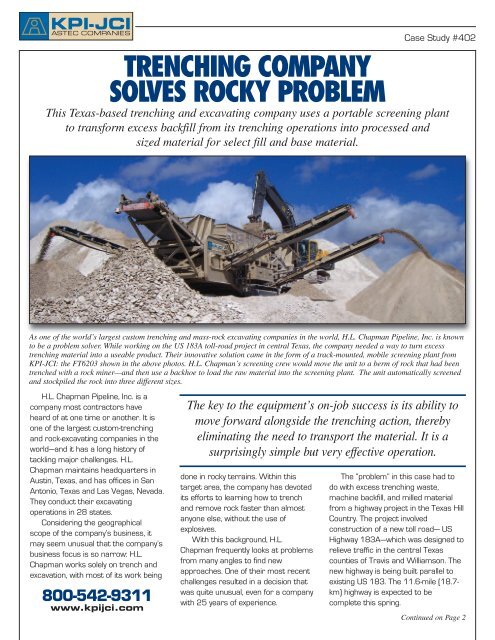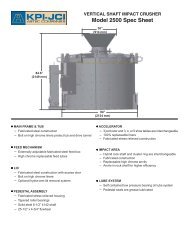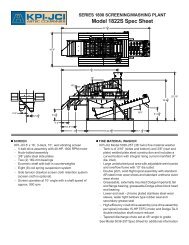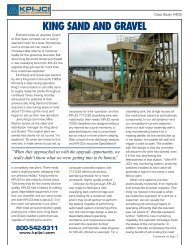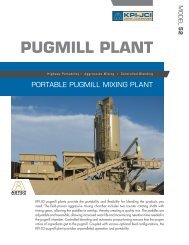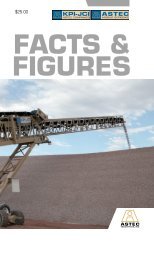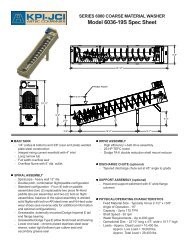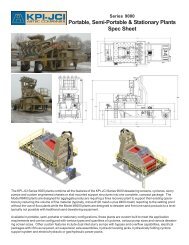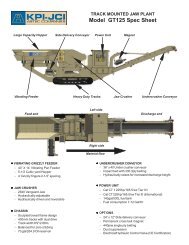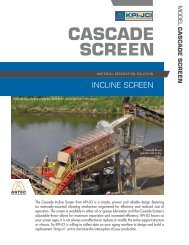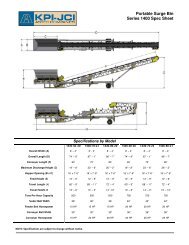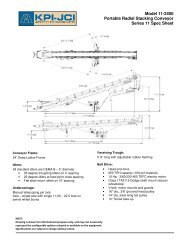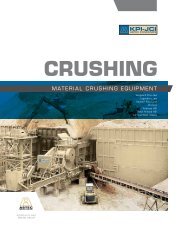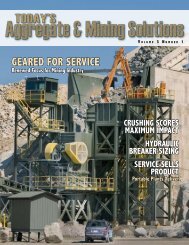TRENCHING COMPANY SOLVES ROCKY PROBLEM - KPI-JCI
TRENCHING COMPANY SOLVES ROCKY PROBLEM - KPI-JCI
TRENCHING COMPANY SOLVES ROCKY PROBLEM - KPI-JCI
Create successful ePaper yourself
Turn your PDF publications into a flip-book with our unique Google optimized e-Paper software.
<strong>TRENCHING</strong> <strong>COMPANY</strong><br />
<strong>SOLVES</strong> <strong>ROCKY</strong> <strong>PROBLEM</strong><br />
Case Study #402<br />
This Texas-based trenching and excavating company uses a portable screening plant<br />
to transform excess backfill from its trenching operations into processed and<br />
sized material for select fill and base material.<br />
As one of the world’s largest custom trenching and mass-rock excavating companies in the world, H.L. Chapman Pipeline, Inc. is known<br />
to be a problem solver. While working on the US 183A toll-road project in central Texas, the company needed a way to turn excess<br />
trenching material into a useable product. Their innovative solution came in the form of a track-mounted, mobile screening plant from<br />
<strong>KPI</strong>-<strong>JCI</strong>: the FT6203 shown in the above photos. H.L. Chapman’s screening crew would move the unit to a berm of rock that had been<br />
trenched with a rock miner—and then use a backhoe to load the raw material into the screening plant. The unit automatically screened<br />
and stockpiled the rock into three different sizes.<br />
H.L. Chapman Pipeline, Inc. is a<br />
company most contractors have<br />
heard of at one time or another. It is<br />
one of the largest custom-trenching<br />
and rock-excavating companies in the<br />
world—and it has a long history of<br />
tackling major challenges. H.L.<br />
Chapman maintains headquarters in<br />
Austin, Texas, and has offices in San<br />
Antonio, Texas and Las Vegas, Nevada.<br />
They conduct their excavating<br />
operations in 28 states.<br />
Considering the geographical<br />
scope of the company’s business, it<br />
may seem unusual that the company’s<br />
business focus is so narrow: H.L.<br />
Chapman works solely on trench and<br />
excavation, with most of its work being<br />
800-542-9311<br />
www.kpijci.com<br />
The key to the equipment’s on-job success is its ability to<br />
move forward alongside the trenching action, thereby<br />
eliminating the need to transport the material. It is a<br />
surprisingly simple but very effective operation.<br />
done in rocky terrains. Within this<br />
target area, the company has devoted<br />
its efforts to learning how to trench<br />
and remove rock faster than almost<br />
anyone else, without the use of<br />
explosives.<br />
With this background, H.L.<br />
Chapman frequently looks at problems<br />
from many angles to find new<br />
approaches. One of their most recent<br />
challenges resulted in a decision that<br />
was quite unusual, even for a company<br />
with 25 years of experience.<br />
The “problem” in this case had to<br />
do with excess trenching waste,<br />
machine backfill, and milled material<br />
from a highway project in the Texas Hill<br />
Country. The project involved<br />
construction of a new toll road— US<br />
Highway 183A—which was designed to<br />
relieve traffic in the central Texas<br />
counties of Travis and Williamson. The<br />
new highway is being built parallel to<br />
existing US 183. The 11.6-mile (18.7-<br />
km) highway is expected to be<br />
complete this spring.<br />
Continued on Page 2
The challenge in this case resulted<br />
in an unusual—and profitable—solution.<br />
While raw trenching backfill is often<br />
problematic, it is possible to screen it<br />
to create products for use in area<br />
construction.<br />
For Chapman, the key was a<br />
FT6203 mobile screening plant from<br />
<strong>KPI</strong>-<strong>JCI</strong>. The FT6203 is one of the<br />
world’s largest mobile processing<br />
plants that was designed specifically<br />
for recycling and aggregate<br />
production, as well as for multiple siteprep<br />
applications. Despite the mobility<br />
of its track mounting, it can output<br />
commercial and spec base, sized<br />
course, intermediate and fine<br />
materials requiring single-stage<br />
reduction. Its heavy track drive<br />
provides excellent onsite mobility. For<br />
longer moves, it is transportable on a<br />
low-boy trailer. H.L. Chapman<br />
considered it to be a perfect match for<br />
the project. The FT6203 “crawls”<br />
alongside the trenches where rockcutting<br />
machines are at work. It<br />
screens the material to make two and<br />
even three products, as needed, for<br />
road base and other materials.<br />
According to Allen Summers, H.L.<br />
Chapman equipment superintendent,<br />
the key to the equipment’s on-job<br />
success is its ability to move forward<br />
alongside the trenching action, thereby<br />
800-542-9311<br />
www.kpijci.com<br />
eliminating the need to transport the<br />
material. It is a surprisingly simple but<br />
very effective operation.<br />
“As the material comes out of the<br />
trencher or road miner, we scrape it<br />
up and build a big berm pile,”<br />
Summers explained. “Then we set up<br />
the screener on a pad right next to the<br />
berm pile. We use a back-hoe to take<br />
the material off the berm and put it<br />
into the FT6203.”<br />
On the highway project, the<br />
products made included 1 in. (2.5 cm)<br />
minus, 1.75 to 2.75 in. (4.5 to 7.0<br />
cm), and over 2.75 in. (7.0 cm). With<br />
the screening plant’s built-in delivery<br />
capability, the products are easily<br />
sorted into separate piles for future<br />
use.<br />
H.L. Chapman generally uses the<br />
FT6203 in an open circuit in conjunction<br />
with the trenching machines<br />
or road miners that are doing<br />
excavation or ditch work. Of course,<br />
the idea of using a screening plant for<br />
this application was not entirely new.<br />
H.L. Chapman had rented another type<br />
of screening plant first, but when the<br />
company saw the <strong>KPI</strong>-<strong>JCI</strong> plant in<br />
operation, they sent back the other<br />
plant and purchased the FT6203.<br />
The production results have been<br />
impressive according to Charles<br />
Farmer, the screen operator with H.L.<br />
Chapman. “Our productivity varies<br />
according to the material,” he said.<br />
“There are different things that affect<br />
it: the dampness of the material, or<br />
what kind of material we’re screening,<br />
or if we are screening a dirt substance<br />
rather than a rock substance. It can<br />
be hard to specify ahead of time what<br />
it will really get a day. If it is solid rock,<br />
we can probably get 1,000 yards (914<br />
m3)—or about 1,300 tons (1,180<br />
tonnes)—a day through it. If it is bigger<br />
material, of course, that’s going to<br />
change it. It varies.”<br />
One advantage of the FT6203 is<br />
the flexibility of the plant’s output.<br />
Farmer noted that the company<br />
generates materials for a variety of<br />
uses, including a pad base for<br />
commercial construction. “That is<br />
basically a select fill,” he explained. “You<br />
can’t really call it road-quality base<br />
because there is no clay mixed in with it.”<br />
Farmer said that the screening<br />
plant’s operations have been mostly<br />
smooth and trouble-free during its<br />
approximately one year of use.<br />
“We didn’t have many problems out<br />
of it in that time—just regular, routine<br />
maintenance. It did the job for me, and<br />
it was a big job. I think we ran<br />
somewhere near 500,000 yards<br />
(382,000 m3) through it in that time<br />
period, working on the US 183A tollroad<br />
project. Then we ran another<br />
50,000 yards (38,200 m3) through it<br />
at another project in the south part of<br />
Austin, Texas.”<br />
Summers agreed. He said there<br />
were some minor problems in the first<br />
six months, but the factory support<br />
was excellent. “The people at the <strong>KPI</strong>-<br />
<strong>JCI</strong> factory bent over backwards to<br />
help us,” he said. “The service<br />
representative is the most helpful<br />
person I have ever seen in this industry.<br />
He helps us in a heartbeat!”


